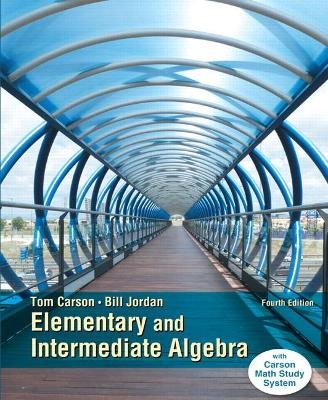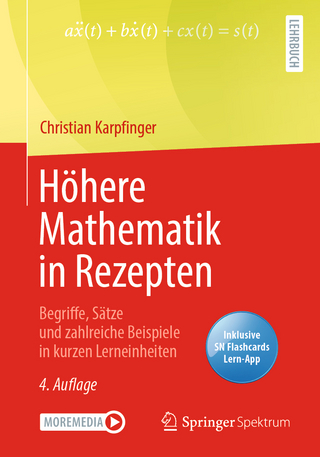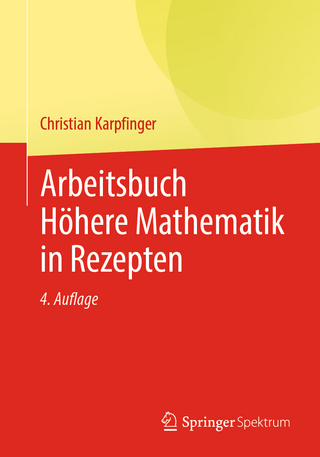
Elementary and Intermediate Algebra
Pearson (Verlag)
978-0-321-92514-5 (ISBN)
- Titel z.Zt. nicht lieferbar
- Versandkostenfrei innerhalb Deutschlands
- Auch auf Rechnung
- Verfügbarkeit in der Filiale vor Ort prüfen
- Artikel merken
Note: You are purchasing a standalone product; MyMathLab does not come packaged with this content. MyMathLab is not a self-paced technology and should only be purchased when required by an instructor. If you would like to purchase both the physical text and MyMathLab, search for:
0321951921 / 9780321951922 Elementary and Intermediate Algebra, Plus NEW MyMathLab with Pearson eText -- Access Card Package
Package consists of:
0321431308 / 9780321431301 MyMathLab -- Glue-in Access Card
0321654064 / 9780321654069 MyMathLab Inside Star Sticker
0321925149 / 9780321925145 Elementary and Intermediate Algebra
Tom Carson ’s first teaching experience was teaching guitar while an undergraduate student studying electrical engineering. That experience helped him to realize that his true gift and passion are for teaching. He earned his MAT in mathematics at the University of South Carolina. In addition to teaching at Midlands Technical College, Columbia State Community College, and Franklin Classical School, Tom has served on the faculty council and has been a board member of the South Carolina Association of Developmental Educators (SCADE). Ever the teacher, Tom teaches outside the classroom by presenting at conferences such as NADE, AMATYC, and ICTCM on topics such as Combating Innumeracy, Writing in Mathematics, and Implementing a Study System. In addition to his work on the Carson Developmental Algebra Series, Tom also is the author of Prealgebra, Fourth Edition. Bill Jordan received his BS from Rollins College and his MAT from Tulane University. A decorated teacher for more than 40 years, Bill has served as the chair of the math department at Seminole Community College and has taught at Rollins College. He has been a member and leader of numerous professional organizations, including the Florida Two-Year College Mathematical Association (president), Florida Council of Teachers of Mathematics (district director), and others. In addition to his work on the Carson series, Bill is also the lead author of Integrated Algebra and Arithmetic, 2/e, also published by Pearson. In his spare time, he enjoys fishing, traveling, and hiking.
Table of Contents
Foundations of Algebra
1.1 Number Sets and the Structure of Algebra
1.2 Fractions
1.3 Adding and Subtracting Real Numbers; Properties of Real Numbers
1.4 Multiplying and Dividing Real Numbers; Properties of Real Numbers
1.5 Exponents, Roots, and Order of Operations
1.6 Translating Word Phrases to Expressions
1.7 Evaluating and Rewriting Expressions
Solving Linear Equations and Inequalities
2.1 Equations, Formulas, and the Problem-Solving Process
2.2 The Addition Principle of Equality
2.3 The Multiplication Principle of Equality
2.4 Applying the Principles to Formulas
2.5 Translating Word Sentences to Equations
2.6 Ratios and Proportions
2.7 Percents
2.8 Solving Linear Inequalities
Graphing Linear Equations and Inequalities
3.1 The Rectangular Coordinate System
3.2 Graphing Linear Equations
3.3 Graphing Using Intercepts
3.4 Slope–Intercept Form
3.5 Point–Slope Form
3.6 Graphing Linear Inequalities
3.7 Introduction to Functions and Function Notation
Systems of Linear Equations and Inequalities
4.1 Solving Systems of Linear Equations Graphically
4.2 Solving Systems of Linear Equations by Substitution; Applications
4.3 Solving Systems of Linear Equations by Elimination; Applications
4.4 Solving Systems of Linear Equations in Three Variables; Applications
4.5 Solving Systems of Linear Equations Using Matrices
4.6 Solving Systems of Linear Inequalities
Polynomials
5.1 Exponents and Scientific Notation
5.2 Introduction to Polynomials
5.3 Adding and Subtracting Polynomials
5.4 Exponent Rules and Multiplying Monomials
5.5 Multiplying Polynomials; Special Products
5.6 Exponent Rules and Dividing Polynomials
Factoring
6.1 Greatest Common Factor and Factoring by Grouping
6.2 Factoring Trinomials of the Form x2 + bx + c
6.3 Factoring Trinomials of the Form ax2 + bx + c, where a ≠ 1
6.4 Factoring Special Products
6.5 Strategies for Factoring
6.6 Solving Quadratic Equations by Factoring
6.7 Graphs of Quadratic Equations and Functions
Rational Expressions and Equations
7.1 Simplifying Rational Expressions
7.2 Multiplying and Dividing Rational Expressions
7.3 Adding and Subtracting Rational Expressions with the Same Denominator
7.4 Adding and Subtracting Rational Expressions with Different Denominators
7.5 Complex Rational Expressions
7.6 Solving Equations Containing Rational Expressions
7.7 Applications with Rational Expressions, Including Variation
More on Inequalities, Absolute Value, and Functions
8.1 Compound Inequalities
8.2 Equations Involving Absolute Value; Absolute Value Functions
8.3 Inequalities Involving Absolute Value
Rational Exponents, Radicals, and Complex Numbers
9.1 Radical Expressions and Functions
9.2 Rational Exponents
9.3 Multiplying, Dividing, and Simplifying Radicals
9.4 Adding, Subtracting, and Multiplying Radical Expressions
9.5 Rationalizing Numerators and Denominators of Radical Expressions
9.6 Radical Equations and Problem Solving
9.7 Complex Numbers
Quadratic Equations and Functions
10.1 The Square Root Principle and Completing the Square
10.2 Solving Quadratic Equations Using the Quadratic Formula
10.3 Solving Equations That Are Quadratic in Form
10.4 Graphing Quadratic Functions
10.5 Solving Nonlinear Inequalities
10.6 Function Operations
Exponential and Logarithmic Functions
11.1 Composite and Inverse Functions
11.2 Exponential Functions
11.3 Logarithmic Functions
11.4 Properties of Logarithms
11.5 Common and Natural Logarithms
11.6 Exponential and Logarithmic Equations with Applications
Conic Sections
12.1 Parabolas and Circles
12.2 Ellipses and Hyperbolas
12.3 Nonlinear Systems of Equations
12.4 Nonlinear Inequalities and Systems of Inequalities
R. Elementary Algebra Review
Appendices
Mean, Median, and Mode
Arithmetic Sequences and Series
Geometric Sequences and Series
The Binomial Theorem
Synthetic Division
Solving Systems of Linear Equations Using Cramer’s Rule
| Erscheint lt. Verlag | 31.3.2014 |
|---|---|
| Sprache | englisch |
| Maße | 220 x 280 mm |
| Gewicht | 180 g |
| Themenwelt | Mathematik / Informatik ► Mathematik ► Algebra |
| ISBN-10 | 0-321-92514-9 / 0321925149 |
| ISBN-13 | 978-0-321-92514-5 / 9780321925145 |
| Zustand | Neuware |
| Informationen gemäß Produktsicherheitsverordnung (GPSR) | |
| Haben Sie eine Frage zum Produkt? |
aus dem Bereich


